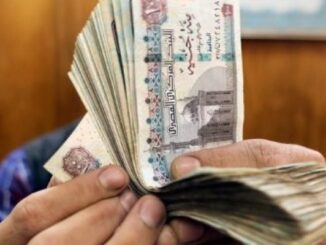
The Egyptian authorities have hiked the minimum wage for private-sector workers for the second time in six months, as a series of dramatic currency devaluations leaves tens of millions of people struggling with soaring living costs.
The National Council of Wages approved raising the figure 11% to 3,000 Egyptian pounds ($97.10) per month, Planning Minister Hala El-Saeed said in a statement Tuesday. In December, authorities upped the minimum wage to 2,700 pounds from the level of 2,400 pounds set a year before, reported Bloomberg.
The latest increase comes as the Middle East’s most populous country is pummeled by inflation that accelerated to almost 33% in May, mainly due to surging food prices.
The Egyptian pound lost about half its value since early 2022 as the government raced to turn around an economy heavily exposed to the fallout from Russia’s invasion of Ukraine.
The devaluations have made crucial imports significantly more expensive.
Last week, Egypt’s Abdel-Fattah al-Sisi made one of his starkest warnings yet about the challenges facing the country, saying Egyptians won’t be able to bear further price rises. He said the issue had become one of national security.
That appeared to suggest further devaluations of the pound may not come as quickly as some economists and analysts had been expecting.
Egypt agreed on a $3 billion loan program with the International Monetary Fund last year and is pressing ahead with reforms including the sale of dozens of state assets.
Privatization deals are key to raising the foreign currency authorities likely need before enacting another devaluation.
Egypt’s inflation increased in May
According to the Central Bank of Egypt (CBE), Egypt’s annual headline urban inflation increased to 32.7% in May 2023 from 30.6% in April 2023. The annual increase was mainly driven by higher food prices and supported by continued higher non-food prices.
The annual food inflation increased to 60% in May 2023, and annual non-food inflation continued to increase to record 19% in May 2023.
The annual core inflation resumed its upward trend to record 40.3% in May 2023, after slightly decelerating for two consecutive months to 38.6 and 39.5% in April and March 2023, respectively.
The monthly core inflation recorded 2.9% in May 2023, compared to 1.7% in April 2023 and 1.6% in May 2022.
The monthly headline urban inflation increased as well in May 2023 to record 2.7% up from 1.7% in April 2023, and was driven by food items and non-food items. Food inflation increased due to a rise in regulated and core food prices.
Higher prices of both regulated and core food items were basically driven by the increase in subsidized food prices (such as sugar and vegetable oil) announced by the Ministry of Internal Trade and Supply; and higher major core food prices (such as red meat, seafood and rice).
The non-food inflation further supported the increase in headline inflation, and was driven by higher prices of Regulated items such as Diesel prices announced by the Fuel Indexation Committee, and the subsequent increase in inland transportation.
Furthermore, Retail items also increased, mostly due to higher prices of clothing, household appliances and cleaning products, among other items. Finally, Services increased on the back of higher expenditure on cafes and restaurants, in addition to pilgrimage trips in line with Eid Al Adha.
The annual rural inflation increased to 34.6% in May 2023 from 32.3% in April 2023.
The nationwide annual inflation increased to 33.7% in May 2023 from 31.5% in April 2023.
Prices of fresh vegetables declined by 1.3% while fresh fruits increased by 4.3%. Together, they contributed by 0.03% to monthly headline inflation.
Prices of red meat increased by 14.8%, to contribute by 0.80% to monthly headline inflation.
Additionally, the prices of processed meat and other fresh meats increased by 9.7 and 8.2%, respectively, to contribute together by 0.07% to monthly headline inflation. This increase came in line with the observance of Eid Al-Adha, but was stronger than its usual seasonal magnitude.
Prices of fish and seafood increased by 11%, contributing by 0.32% to monthly headline inflation.
Prices of market rice increased by 10.6% for the fourth consecutive month, contributing by 0.19% to monthly headline inflation.
Prices of poultry declined by 5.7%, contributing by negative 0.39% to monthly headline inflation.
Prices of other core food items including eggs, pasta, fats, sugar, pulses, market tea and dairy products, among others, increased to contribute by 0.34% to monthly headline inflation.
Prices of regulated items increased by 2.8%, to contribute by 0.55% to monthly headline inflation. This was mainly driven by higher tobacco prices; higher Diesel prices as announced by the Fuel Indexation Committee on 3rd of May 2023 and the subsequent increase in public inland transportation prices; as well as higher subsidized sugar and vegetable oil prices in line with the announcement of the Ministry of Internal Trade and Supply on 1st of May 2023.
Prices of services increased by 1.6% to contribute by 0.48% to monthly headline inflation. This was primarily due to higher expenditure on restaurants and cafes, private inland transportation, rents, pilgrimage trips and outpatient services.
Prices of retail items increased by 2.4%, contributing by 0.31% to monthly headline inflation. This was mainly due to an increase in the prices of clothing, personal care products, household cleaning products and appliances, and purchasing of vehicles.
Monthly core inflation was affected by price changes of the aforementioned core CPI items. Core food items, services, and retail items contributed by 1.80%, 0.64%, and 0.42% to monthly core inflation, respectively.



